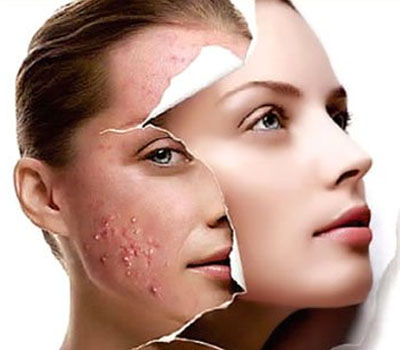Acne Treatment
- Home
- Acne Treatment

Acne Treatment
Acne is a common skin condition that can affect individuals of various ages. Effective acne treatment involves a combination of skincare practices, lifestyle adjustments, and, in some cases, professional interventions. Here's a comprehensive guide to acne treatment:
Skincare Routine:
- Gentle Cleansing: Use a mild cleanser to wash the face twice daily to remove excess oil, dirt, and bacteria.
- Non-Comedogenic Products: Choose skincare and makeup products labeled non-comedogenic to avoid clogging pores.
- Topical Treatments: Incorporate topical treatments containing ingredients like benzoyl peroxide, salicylic acid, or retinoids to target acne.
Lifestyle Adjustments:
- Healthy Diet: Consume a balanced diet rich in fruits, vegetables, and whole grains. Limit dairy and sugary foods.
- Hydration: Stay well-hydrated by drinking plenty of water to help flush out toxins.
- Regular Exercise: Physical activity can promote circulation and reduce stress, which may contribute to acne.
Avoid Picking or Squeezing:
- Refrain from picking or squeezing acne lesions to prevent scarring and further inflammation.
Professional Treatments:
- Dermatologist Consultation: Seek guidance from a dermatologist for personalized acne treatment recommendations.
- Prescription Medications: Dermatologists may prescribe topical or oral medications, such as antibiotics or oral contraceptives, based on the severity of acne.
- Chemical Peels: Chemical peels can help exfoliate the skin and improve acne by removing dead skin cells.
- Light Therapy: Certain light-based therapies, such as blue light or red light, can target acne-causing bacteria or reduce inflammation.
Acne Scar Treatment:
- Microneedling: Microneedling can stimulate collagen production and improve the appearance of acne scars.
- Laser Resurfacing: Laser treatments can address both active acne and scars by promoting skin renewal.
Hormonal Management:
- For individuals with hormonal acne, hormonal treatments, such as oral contraceptives or anti-androgen medications, may be considered.
Isotretinoin (Accutane):
- Prescription Medication: Isotretinoin is a potent oral medication reserved for severe or persistent acne. It requires close monitoring due to potential side effects.
Consultation and Follow-Up:
- Regular follow-up appointments with a dermatologist are crucial to assess progress, adjust treatment plans, and address any concerns.
Patient Education:
- Dermatologists provide education on proper skincare, lifestyle modifications, and potential triggers for acne.
Psychological Support:
- Acne can impact mental well-being. Dermatologists may collaborate with mental health professionals to provide psychological support.
Consistency is Key:
- Effective acne treatment requires consistent and patient adherence to the prescribed regimen.
Remember:
- Individualized Approach: Acne treatment varies based on skin type, acne severity, and individual response.
- Patience: Results may take time, and persistence is key for successful acne management.
For personalized acne treatment plans and guidance, consult with a qualified dermatologist to address your specific concerns and achieve clearer, healthier skin.

